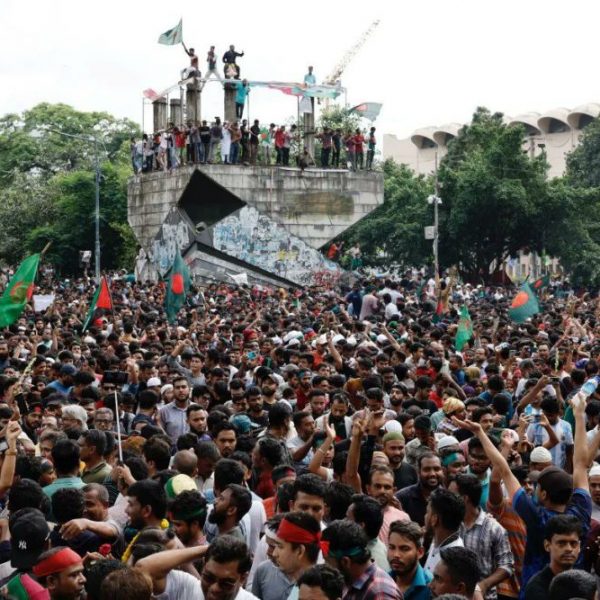
Prime Minister of Bangladesh, Sheikh Hasina, resigned and fled to neighbouring India on Monday, following weeks of protest that began out of anger at civil service jobs quotas before transforming into a powerful anti-government movement.
By Jason OSBORNE
Dramatic footage emerging from the south Asian nation this week showed protestors inside the prime minister's official residence, the presidential palace and the national parliament, which was dissolved on Tuesday after protesting student leaders set a deadline to dissolve parliament and warned that a "strict programme" would be launched if the deadline was not met.

- POPULAR FRONT (@PopularFront_)
Protesters celebrated the end of Hasina's 15 years in office yesterday by climbing on tanks and attacking the head of a statue of Hasina's father, independence leader Sheikh Mujibur Rahman, with an axe in the capital city, Dhaka.
In a national address, Bangladesh's army chief, General Waker-uz-Zaman confirmed Prime Minister Hasina's resignation and said the military would help form an interim government.
How did it begin?
Demonstrations started last month after the High Court reinstated a quota system for government jobs, overturning a 2018 decision by Hasina's government to bring it to an end.
That system saw 30% of civil service posts reserved for relatives of veterans who fought in Bangladesh's war of independence from Pakistan in 1971. However, when it was abolished in 2018, closer to 56% of government jobs were blocked under various quotas.
Quotas other than the veterans' relatives, included women and those from underdeveloped districts, receiving a share of a tenth each, while 5% was allotted to indigenous communities, and 1% for the disabled.
The protesting students wanted all categories abolished, with the exception of those for indigenous communities and the disabled.
Protestors argued that the system was discriminatory and that it favoured members and supporters of Hasina's ruling Awami League party - including Hasina herself, whose father is widely regarded as the founder of modern Bangladesh. He was assassinated in 1975.
High unemployment also stoked national anger - with over 30 million of the 170 million-strong population neither in work nor in education - as well as the perception that Bangladesh's previously strong economic growth had stagnated in recent years under Hasina.
The protests began at Dhaka University on July 1 before spreading to other campuses and cities across the country in almost daily street gatherings that included rail and road blockades.
July 15 saw violence erupt when members of the Bangladesh Chatra League, which is the student wing of the then-ruling Awami League party, reportedly attacked student protesters inside the Dhaka University campus.
Further clashes followed between protesters and government supporters, with the police becoming embroiled. Bangladesh deployed its paramilitary Rapid Action Battalion, which was sanctioned by the United States in 2021 after "widespread allegations of serious human rights abuses".
The expanding unrest prompted the government to shut down internet services and impose an indefinite nationwide curfew, while human rights groups accused the authorities of using excessive force against protesters - an accusation the government denied.
The flames were fanned when violence began to result in daily fatalities, as well as Hasina's reported use of the offensive term 'razakar,' to describe the protesters, which refers to those who allegedly collaborated with the Pakistani army during the 1971 independence war.
As a result, what began as a protest against government jobs quotas transformed into a movement against Hasina and her government.
Now, protestors are calling for Nobel Peace Prize winner, Muhammed Yunas, to be named chief advisor of the new interim government, who has reportedly accepted the task.
Yunus, 84, is a famous face in southeast Asia as the founder of microlender Grameen Bank. He faced multiple court cases over the years in what his supporters described as a politically motivated 'vendetta' by the deposed Hasina, who they claim saw him as a potential rival.
Religious tensions
However, reports have also emerged of looting, rioting and sectarian killings taking place amidst the unrest, with videos of the minority Hindu community coming under attack circulating on social media.
Two Hindu councillors are reported to have been killed, with a member of the Economic Advisory Council of the Indian Prime Minister, Sanjeev Sanyal, commenting on a post describing the lynching of Awami League leader Haradhan Roy and his nephew: "As a Bengali Hindu and a descendant of refugees, find this particularly chilling".
Original article: Gript